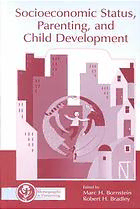Table Of ContentS o cio e co n o m ic Status,
Parenting, and
C h ild D e ve lo p m e n t
SOCIOECONOMIC STATUS,
PARENTING, AND
CHILD DEVELOPMENT
MONOGRAPHS IN PARENTING
Marc H. Bomstein, Series Editor
Borkowski, Ramey, and Bristol-Powcrs Parenting and the Child’s World:
Influences on Academic, Intellectual, and Social-Emotional Development
Bornstein and Bradley Socioeconomic Status, Parenting, and Child Development
Cowan, Cowan, Ablow, Johnson, and Measelle The Family Context of
Parenting in Children’s Adaptation to School
Bornstein Parenting: Essential Readings
SOCIOECONOMIC STATUS,
PARENTING, AND
CHILD DEVELOPMENT
Edited by
Marc H. Bornstein
Notional Institute of Child Health and
Human Development
and
Robert H. Bradley
Uniuersity of Arkansas
at Little Rock
vp Psychology Press
Taylor & Francis Croup
New York London
This edition published 2012 by Routledge
2 Park Square, Milton Park, Abingdon, Oxon 0X14 4RN
Simultaneously published in the USA and Canada by Routledge
711 Third Avenue, New York, NY 10017
Senior Acquisitions Editor: Bill Webber
Editorial Assistant: Erica Kica
Cover Designer: Kathryn Houghtaling Lacey
Production Manager: Marianna Vertullo
Full Service Compositor: TechBooks
Text and Cover Printer: Sheridan Press
This book was typeset in 10/12 pt. Times Roman, Bold, and Italic.
The heads were typeset in Americana, Italic and Bold.
Copyright © 2003 by Lawrence Erlbaum Associates, Inc.
All rights reserved. No part of this book may be reproduced in
any form, by photostat, microfilm, retrieval system, or any
other means, without prior written permission of the publisher.
Lawrence Erlbaum Associates, Inc., Publishers
10 Industrial Avenue
Mahwah, New Jersey 07430
First issued in paperback 2012
Routledge is an imprint of the Taylor & Francis Group, an informa business
Library of Congress Cataloging-in-Publication Data
Socioeconomic status, parenting, and child development / edited by Marc H. Bom stein
and Robert H. Bradley.
p. cm.—(Monographs in parenting series)
Includes bibliographical references and indexes.
1. Parenting. 2. Parent and child. 3. Child development. 4. Socioeconomic status.
I. Bomstein, Marc H. II. Bradley, Robert H., 1946- III. Series.
HQ775.8 .S63 2003
649'.I—dc21 2002026382
ISBN13: 978-0-415-65427-2 (PBK)
ISBN 13: 978-0-805-84242-5 (HBK)
Bernice, Gilbert, Helen, Lea, and Jon
M.H.B.
Harold, Margaret, Rozalyn, and Suzanne
R.H.B.
. who have taught us the lessons and joys of parenting.
This page intentionally left blank
Contents
Series Foreword
Monographs in Parenting ix
Socioeconomic Status, Parenting, and Child Development:
An Introduction 1
PART I. SES: MEASUREMENT AND ECOLOGY
1 A Decade of Measuring SES: What It Tells Us and Where to go
From Here 13
Margaret E. Ensminger and Kate Fothergill
2
Socioeconomic Status, Parenting, and Child Development:
The Hollingshead Four-Factor Index of Social Status and the
Socioeconomic Index of Occupations 29
Marc H. Bomstein, Chun-Shin Hahn, Joan T. D. Suwalsky, and
O. Maurice Haynes
3
Off With Hollingshead: Socioeconomic Resources, Parenting,
and Child Development 83
Greg J. Duncan and Katherine A. Magnuson
4
Socioeconomic Resources, Parenting, Poverty, and Child
Development Among Immigrant Families 107
Andrew J. Fuligni and Hirokazu Yoshikawa
5
Methodological Issues in Studies of SES, Parenting, and Child
Development 125
Lois Wladis Hoffman
PART II. SES: PARENTING AND CHILD DEVELOPMENT
6 Causes and Consequences of SES-Related Differences
in Parent-to-Child Speech 147
Erika Hoff
vii
viii CONTENTS
7
Age and Ethnic Variations in Family Process Mediators of SES 161
Robert H. Bradley and Robert F. Corwyn
8 Socioeconomic Status in Children’s Development and Family
Environment: Infancy Through Adolescence 189
Allen W. Gottfried, Adele E. Gottfried, Kay Bathurst, Diana
Wright Guerin, and Makeba M. Parramore
9
Moving on Up: Neighborhood Effects on Children and Families 209
Tama Leventhal and Jeanne Brooks-Gunn
10
What Are SES Effects Effects Of?: A Developmental
Systems Perspective 231
Richard M. Lemer
About the Authors 257
Author Index 265
Subject Index 211
Series Foreword
Monographs in Parenting
Parenting is fundamental to the survival and success of the human race. Everyone
who has ever lived has had parents, and most adults in the world become parents.
Opinions about parenting abound, but surprisingly little solid scientific information
or considered reflection exists about parenting. Monographs in Parenting intends
to redress this imbalance: The chief aim of this series of volumes is to provide
a forum for extended and integrated treatments of fundamental and challenging
contemporary topics in parenting. Each volume treats a different perspective on
parenting and is self-contained, yet the series as a whole endeavors to enhance
and interrelate studies in parenting by bringing shared perspectives to bear on a
variety of concerns prominent in parenting theory, research, and application. As
a consequence of its structure and scope, Monographs in Parenting will appeal,
individually or as a group, to scientists, professionals, and parents alike. Reflecting
the nature and intent of this series, contributing authors are drawn from a broad
spectrum of the humanities and sciences—anthropology to zoology—with repre
sentational emphasis placed on active contributing authorities to the contemporary
literature in parenting.
Parenting is a job whose primary object of attention and action is the child—
children do not and cannot grow up as solitary individuals—but parenting is also
a status in the life course with consequences for parents themselves. In this forum,
parenting is defined by all of children’s principal caregivers and their many modes
of caregiving. Monographs in Parenting encompass central themes in parenting ...
Who Parents?
Biological and adoptive mothers, fathers, single-parents, and divorced and remar
ried parents can be children’s principal caregivers, but when siblings, grandparents,
and nonfamilial caregivers mind children their parenting is pertinent as well.
Whom Do Parents Parent?
Parents parent infants, toddlers, children in middle-childhood, and adolescents,
but special populations of children include multiple births, preterm, ill, develop-
mentally delayed or talented, and aggressive or withdrawn children.
ix

